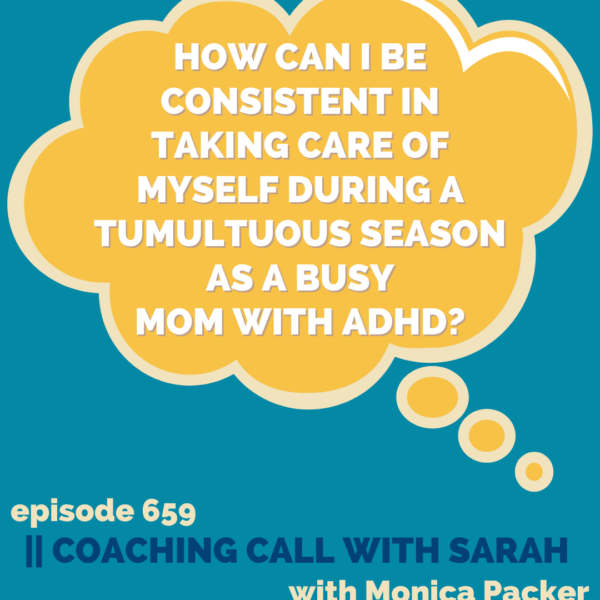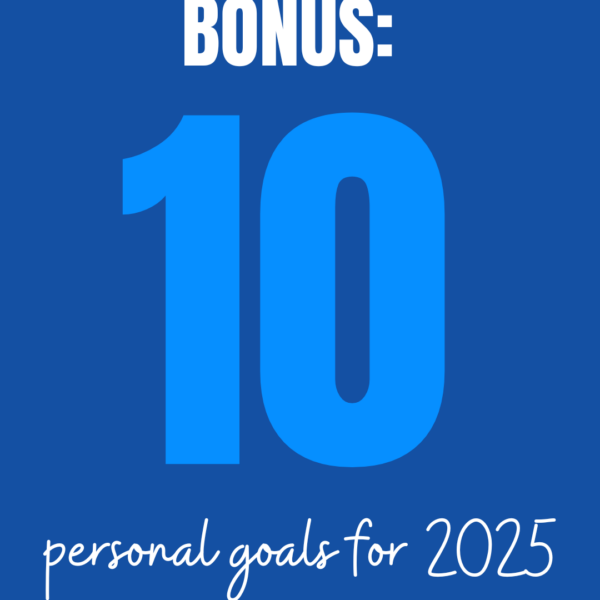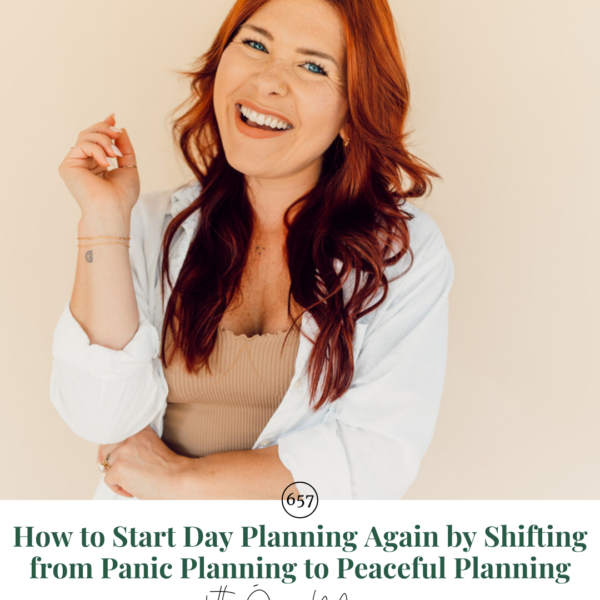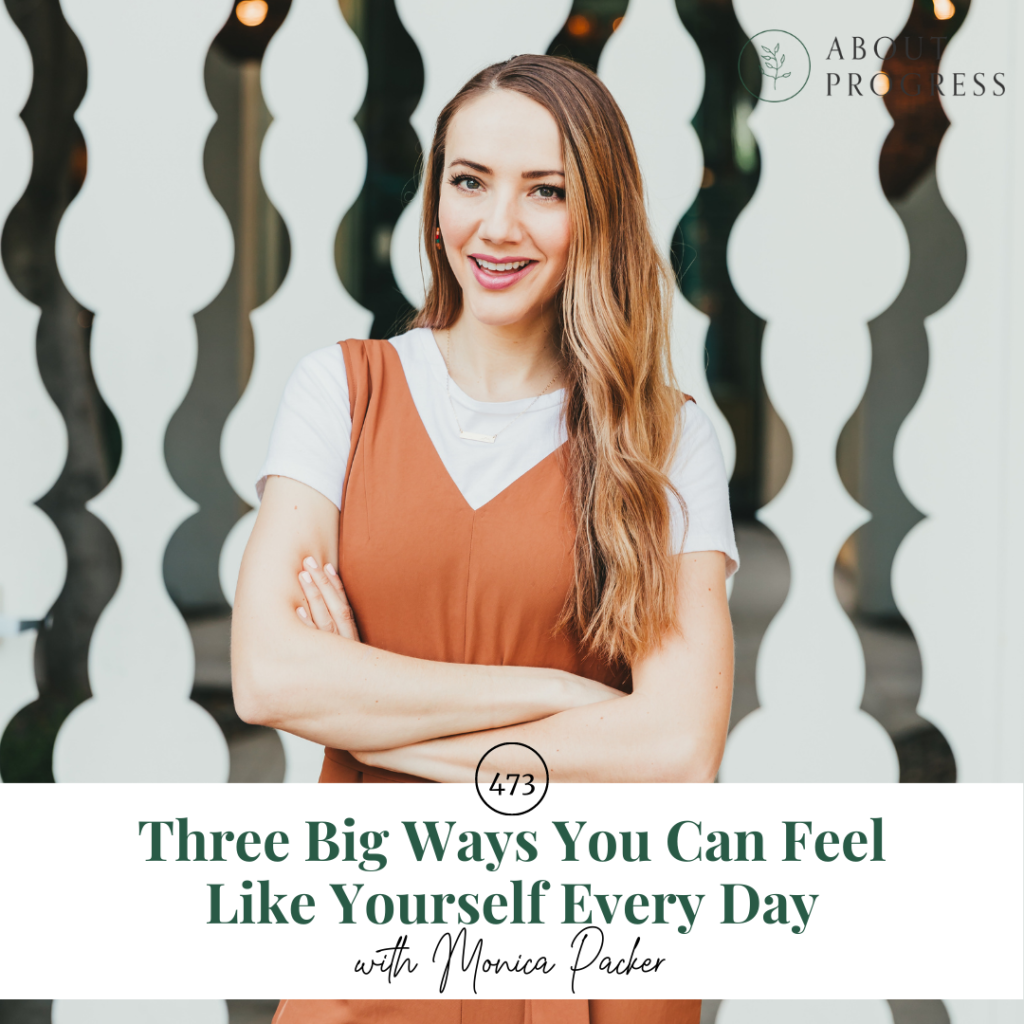
With the benefit of hindsight on my side, I can look back and see a stark contrast between the way I felt after my third child was born, and the way I felt after my fourth child was born. As I’m currently back in that season with my fifth newborn, my reflection allows for the things I want to teach you today: the difference came from whether or not I was feeling like myself. It’s a concept that is easier said than done, especially for many women that I hear from, so I’ve boiled it down to three big ways you can feel like yourself every day.
Do you ever feel like you have a life that you should be happy with, but the day-to-day leaves you drained, impatient, and resentful? After listening to this episode, and implementing the three shifts, you should be able to have more energy for your responsibilities, more presence of mind, and the clear ability to make choices that align with your real values. And if my story doesn’t convince you that this is important, then I hope the stories from our community will, because prioritizing yourself IS prioritizing what matters.
This episode is brought to you by PrepDish, try it for 2 weeks free at PrepDish.com/PROGRESS
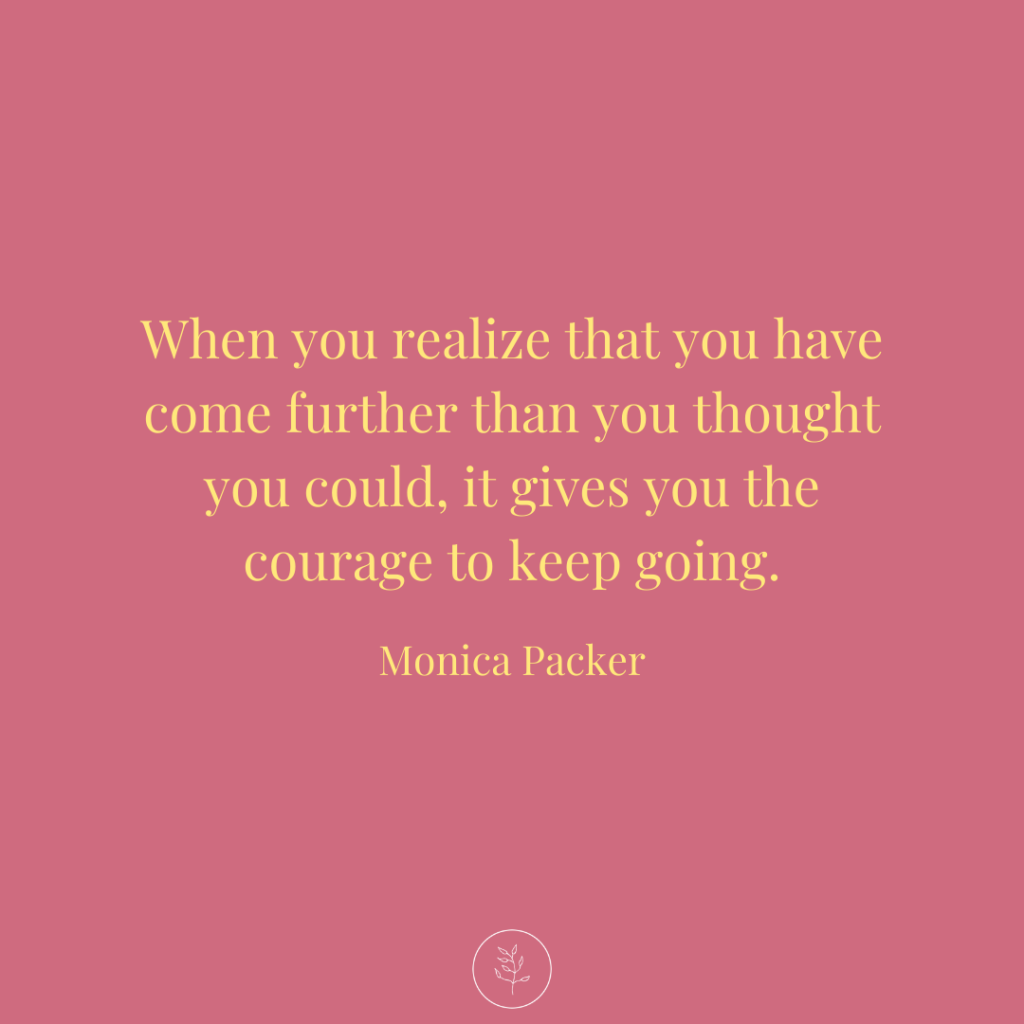
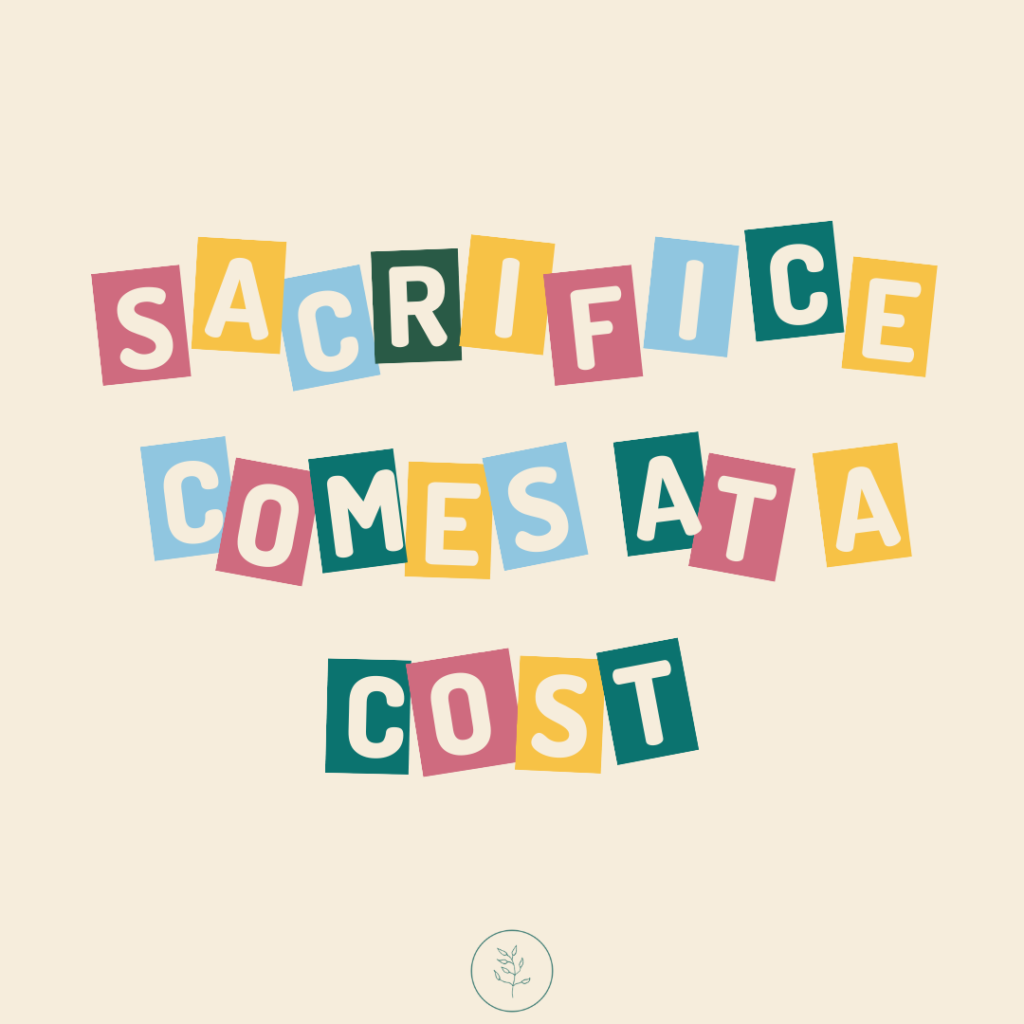
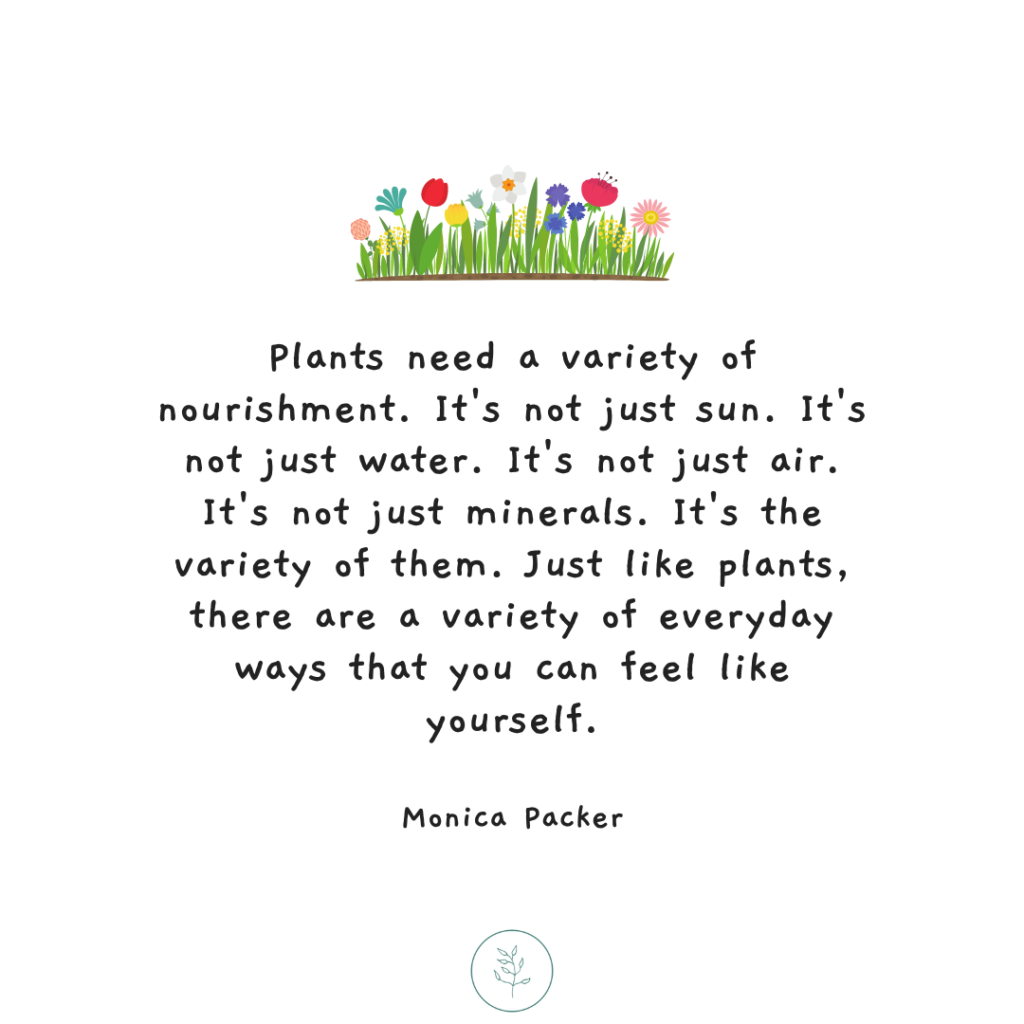
About a few other things…
Do you struggle to create habits that stick? It’s not your fault. The truth is simple: you’ve been trying to form habits using methods designed for perfect robots–not real women living real lives. It’s time to change that. If I could help you gain confidence in creating habits AND guide you to uncover the ONE supportive habit to deeply care for yourself, could you commit 21 days to learning this method? The Sticky Habit Method is a 21-day course that revolutionizes the habit-formation process. It’s real habits for real women.
Sign up for the Go Getter Newsletter to get Progress Pointers in your inbox every Tuesday.
This episode is brought to you by Headspace, try it for free for 30 days when you go to headspace.com/progress
This episode is brought to you by LuvBug, get a free 7 day trial at LuvBuglearning.com
You can listen the episode below, or on Apple Podcasts/iTunes, Spotify, Youtube, Overcast, Stitcher, Pocketcasts, or search for “About Progress” wherever you get your podcasts. If you like the show please share it, subscribe, and leave a review!!
SHOW NOTES
Ultimate Values Exercise + Values Episode
Finding Me Academy
DSL Guide
Try me FREE Class and check out my NEW Habit Course
Leave a rating and review for the podcast!
Lend your voice and experience + be featured on the show HERE
Join Monica on Facebook and Instagram
Songs Credit: Pleasant Pictures Music Club
TRANSCRIPT
Monica: Welcome to About Progress. I’m Monica Packer, a regular mom and recovering perfectionist who uncovered the truest model to dramatic but lasting personal growth. It’s progress made practical. Join us to leave the extremes behind and instead learn how to do something to grow in ways that. I’ve been a coach for five years, and one of the biggest takeaways that all my coaching clients have expressed that they got from coaching was the power of knowing what their values were and aligning their lives to their values.
If you want help identifying yours, I’ve gotten an incredible free resource for you. It’s called the Ultimate Values Exercise. You can get it at about progress.com/values.
I think hindsight bias really is the best teacher, and it’s also really good at showing you how much you’ve changed over time. It’s really difficult to see it in the moment, and if you are in the middle of that friend, I’m raising my hand because I am too in some way, as we all are. But there was one contrast for me, that special hindsight bias moment that really helped me see how much I had indeed changed early on in this experiment of choosing progress over perfection.
It actually came down to the difference I felt internally between my third child being born and my fourth child. The nutshell version of this is after my third child, that’s really when my life, honestly felt like it was falling apart. I was not able to show up the ways that I wanted and needed to for my responsibilities.
I was a different person. I also didn’t know who I was to top it off. I felt a lot of times despair, stuck, lost, resentful, angry. All of these things aren’t really me. This is where I insert the story most of you should know very well by now. And that’s like five months after I had this baby, six months before, before I turned 30 is when I began this grand experiment at figuring out what will life look like if I were to make it about progress not perfection.
and that work slash experiment took on a life of its own, but it was also gradual. And it took many years that there were a lot of times, right? Like I’m don’t feel like I’m really changing unless I had a couple moments of hindsight bias that taught me differently and that fast forwards to one of those moments for me.
was, after I had my fourth child. Now, let me just say the context here was quite different from the, the birth of my third child and actually in ways that are maybe opposite of what you think Externally, my life wasn’t that much different in terms of, you know what actually was going on with my life? I still had really little kids who had a lot of needs, some of them special needs.
My husband still worked all the time. We didn’t have enough money to spend on, on, on, on things to help support me. But even beyond that, there were some pretty crazy things going on before leading up to and after the birth of my fourth child, including a botched kitchen renovation. We didn’t have any cabinetry, any running water.
We didn’t even have a laundry actually now that I remember when my fourth was born. But to top it off the week he was born, our only toilet in our small home stopped working. Our, our car broke down. We had to drive my in-law’s car to the hospital so I could deliver the baby. And shortly after he was born, we had a really, honestly, kind of life changing experience of him having.
Twisted bowels and needing to have emergency surgery and then spend a week in the picu. All, all, the best case scenario you can have was something like that. But yeah, like it was a really, really stressful time. I had a child that literally almost died under my care. And yet with all the awful things going on, then this is when I had the moment where I realized there is so much chaotic happening right now. There’s so much out of my control and there’s so much stressful, and it was stressful and it was hard, and I let myself feel it, but at the same time, I could see and feel a difference that I was myself. Even in the midst of all that turmoil and, and, and, and those awful circumstances, I didn’t feel stuck or lost.
I didn’t feel angry or resentful. Instead, I felt like Monica and noticing that contrast between the birth of my third and all those awful feelings I was feeling before. And then the birth of my fourth and all the good, like I feel like myself feelings helped me see in that moment. Wow, I have come even farther than I thought I had, and it gave me the courage to keep going.
Now, the, those contrast moments are so helpful and you will have them if you have not had them yet, I can promise you. You will. But what I wanna talk to you today about is, is just that, what that difference came down to for me was feeling like myself. In this community, we have three pillars of things we focus on.
One is identity. Another is habits, and the third is fulfillment. My definition of fulfillment is that we feel full of our true selves. That’s what that difference came down to for me, between my third and fourth child. When women are full of their true selves, it’s like watch out world. And I’m not exaggerating that.
As the way I see it, the world is desperate for women who are truly alive, who not only know themselves and feel like themselves, but are therefore able to show up as themselves. Today we are going to talk about how to feel like yourself every day.
Before I share the how I have to share the the why. Okay. And this is really important because otherwise I, I, how are you gonna buy into this vision that it matters that you even feel like yourself? I think many of us just bow to martyrdom instead because it feels almost easier to just play the part of the sacrificial lamb of our families.
As you’ve known from my own experience, that leads to other things we don’t want anymore, and we’re gonna talk about that. So let’s actually start there. Why does this matter? Why does it matter that we feel like ourselves every day that we have that fulfillment? So let’s start with the reverse of what happens when we don’t.
When we are, when we don’t have fulfillment, there’s a long list we could go to, but let’s begin with the most obvious. It affects the responsibilities that we are often sacrificing, that sense of self, that sense of fulfillment for and with women, we know from research that our responsibilities lie a lot within relationships.
So not only do our responsibilities, when we are missing fulfillment and feeling like ourselves in our lives, but our relationships suffer too. And again, these are the things we are often putting ourselves on the sacrificial altar for. And weirdly, that loss of self does not serve those things. It leads to resentment and it leads to martyrdom.
I see martyrdom and actually resentment too, really connected to this feeling of despair. And despair is connected to feeling like we don’t have choices. That’s a lot of what women do. We’re trying and our good intentions to, to serve these responsibilities and these relationships well. But we bow to despair because we think the only way is to not make choices for ourselves, to not include ourselves as part of those things.
There are costs that we are paying to this kind of sacrifice. And I want you to think about what yours are. Maybe you can begin with just what are the feelings that you don’t like that you’re having right now, like I did after my third kid. I mean, this goes down to some things you might be surprised by.
Like are you surprised that you feel angry often, or resentful? or stuck or lost, even if you have a lot of what you wanted, maybe growing up or what you want now, or maybe you don’t and, and those are the reasons too. But regardless, those are signs right there that we need to focus on helping you feel like yourself every day.
So we began with the negative here, like what the repercussions are when we don’t prioritize fulfillment in our day-to-day lives. Now let’s start with some of the, or let’s go on to some of the positives here. When you feel like yourself, there’s some great things that happen. One is that you actually have more energy.
All those negative feelings I described before, they’re also very draining. I would also say physically and mentally, spiritually, I just felt exhausted. I didn’t feel like myself, but I also felt exhausted. When you show up as you to your day-to-day life, you will have more physical. Mental, emotional, spiritual energy, more energy to give to the things that you want to prioritize in your life, including the responsibilities and relationships that we talked about before.
Another why it’s important that you feel like yourself is that with increased fulfillment comes an increase in presence, meaning you being able to be present to your life. And as part of that, actually. Live your life. One of the surprising feelings I think women often get when they’re not prioritizing fulfillment is numbness, is apathy of just floating through life and going through with the motions of the martyrdom that they’ve subscribed to.
And I don’t say that with blaming the victim mindset because I’m there too. And this is modeled and taught to us a lot anyway, so this is another positive about why it helps when we find fulfillment is that we can actually be present to our lives and show up to them in a beautiful way that is absolutely missing, otherwise.
And the final way I would say that this is important. Why this is important is because when you are yourself, you have more ability to make choices. I shared about how despair often comes when we feel like we don’t have choices, but when we can show up with more energy, more presence, we also have a stronger ability to make real choices.
And these choices are ones that align back with who we are. It’s really like a symbiotic relationship. It’s a, it’s a cycle here. Okay. . I want to share a couple real life examples of people who have learned to prioritize fulfillment and some, some of the differences it made in their lives too. These come from things that clients have written me.
They’ve come from women in this community who have sent me dms that I’ve saved and emails. I have some folders on my inbox and, and a folder in my phone where I share like the, the words I get from people that I’m just like, this is why I’m doing this work. So let me share some of these. Here’s from one client.
She says, quote, “I didn’t realize the changes I had made until last week when I was in a situation that I usually respond poorly to. I didn’t react how I had every time before. I shocked myself. I’ve grown in ways I hadn’t realized until months of months down this journey of rediscovering myself. I’ve noticed my thought patterns have changed. I talk to myself differently. I also respond differently to my kids.”
I love that one. That was from a coaching client. Here’s another one who did a the coaching program I did the progress program. She said, the fog is starting to lift and revealing what I really want. Oh, isn’t that so lovely? The fog is lifting.
Here’s a DM I got from another woman, and this is just her sharing about what changed for her as she worked on her do something list. She said, quote, I hadn’t felt like myself in five years, and boom, the clouds parted just a little bit. You helped change my life, unquote.
I love what another client said too. She said, quote, if I don’t carve out time to intentionally keep discovering who I am, I find myself frustrated and overwhelmed and feeling out of touch with myself again. So for her, the reason why she wanted to prioritize her own development and fulfillment was because she knew the reverse of what would happen if she didn’t.
Now this is an ongoing work, just like this last person just said. It needs to be in intentionally happening over time. It needs to be part of who we are and how we live our lives. And if that is what you are wanting, you are wanting the how now, how to do this ongoing work that’s coming up right after the break.
One of the biggest shifts I help women make in regards to their habits is the mindset shift that habits are there to support them. If you want to feel like yourself, you also need some supportive habits that make that possible. If you want to learn how, go to about progress.com/sticky habit method and sign up for my course.
That helps women create real habits that help them show up to their lives as themselves. You can find that again@aboutprogress.com slash sticky habit method.
We’ve shared the why now, let’s go to the how. To me, there’s actually two parts to the how. The first one actually won’t take long for me to describe, but it’s more of the bigger picture. How, and this to me is in general, in order to feel like yourself every day, you need a bigger picture view of knowing what actually helps you feel like yourself.
So this might be a little confusing. We’re like, in order to feel like myself, I need to do things to feel like myself, but in order to do things to feel like myself, I need to know what seeds of myself I need to prioritize. Yes. Okay, so let’s break this down a little bit better.
Let’s imagine that you are a garden and that as part of this garden, you start with seed. and those seeds are really imperative, obviously, because without them the garden can’t grow. This sense of fulfillment and being like yourself can’t develop. But to know what those, to know what to even plant, you have to have a knowledge of what seeds need to be put in the soil, what things need attention, what they need, what need nourishment so that they can.
when you’re looking at the big picture, I’m just talking about what are some things that help you feel like you, some examples for me include some things I do that help me feel like myself are things like general stuff like creativity, being outside in nature, moving my body, reading, baking, and, and, and more.
Learning is a big part too for me, learning. Music as well, and those are kind of like these general categories of seeds. I’m like, I know these things. When they’re prioritized, they help me feel like myself. So now that I’ve got those seeds, I can now plant them in the soil. And then it comes down to the daily small picture of putting in the work to nourish these seeds to work on this garden in.
But really essential ways every day. So that’s what gets us to the second half of the how here it’s the day-to-day ways. Before I do that first though, if you are struggling with the bigger how, and you want some help being able to figure out what your interests are, what are things that help you feel like you, if you don’t even know where to start with that, I’ve got a great resource for you.
And it’s the DSL guide. DSL stands for do something list. It is what can help you. Figure that out. There’s tons of free resources, including a workshop I taught that you can get the replay for examples of other community members, DSLs and the guide that helps you step by step, create your own, and you can find that all@aboutprogress.com slash dsl.
So now let’s go back to the small picture. This is where again, we have day-to-day ways to nourish the seeds to grow into a full garden of fulfillment. This is when I get to share. So a breakdown, right? Okay. Now I want you to again, think gradually. Small doses over time and with variety, because as we know with gardening, even if you’re not really a gardener like me, you also know that plants need variety in terms of the the kinds of nourishment that you’re giving them, right?
It’s not just sun. It’s not just water. It’s not just air. It’s not just minerals. It’s like the variety of them. So let me break down the variety of everyday ways that you can feel like yourself. The first is with supportive habit. The second is inserting yourself into your responsibilities, and the third is time outside of your responsibilities.
We are going to break this down. Of course, I’m gonna say habits, why? That’s the first one, right? Supportive habits. Okay. My friends, let me tell you. Even after the birth of my fourth child, when I had really worked on fulfillment and I had done that dsl, I really knew who I was. I had these seeds, I was nourishing them in big ways, but I got to a plateau with my personal development and my growth.
And what it came down to for me was not having a lifestyle that helped supported what I knew I needed to do to find fulfillment. In other words, I was tired. I didn’t have, like the nutrition I needed. I didn’t have the clarity of mind because I wasn’t like journaling or meditating. I needed to have shifts in my everyday life to help support and make room for that fulfillment.
I, I, I already knew how to access, but I didn’t have the energy or the time. Right. That’s why supportive habits. , I say supportive habits because that’s one of the biggest shifts we make with habit formation is helping women know that it has to be about you. So when I say habits, I’m not talking about whatever metrics you see out there that tell you this is what it takes to be a good person.
I want you to think of supportive habits as things that are self-care centric. Things that help you have the energy and the time you need to. Find and prioritize fulfillment in your day-to-day life. These can include things like movement and journaling and meditating. Whatever helps you have that time and energy you need.
Okay, but another version of a supportive habit for you is not just the one that can allow you to have the time and energy. These are supportive habits that are very interest centric, meaning seed centric. So there are those supportive habits that create the time and energy, but then there are supportive habits that are really seed centric, meaning they are not there to just create time and energy.
They’re there just for, to help you feel like yourself, but you want them so regularly, part of your life, you want them to be a regular habit. For me, that looks like reading. When I read, it doesn’t create time for me. It oftentimes creates energy, but that’s not the purpose for me, that’s just more about feeding a very specific seed.
When I read, I feel like myself. For you, that could be a variety of things, but you know that you want a regular way to prioritize this seed of fulfillment in the form of a habit. So again, the first way that you can feel like yourself every day is via supportive habit. those that create time and energy so you can feel like yourself and find more ways to find fulfillment and other habits that are completely just about fulfillment.
And that’s the whole point. The second main way that you can feel like yourself every day is by inserting yourself into your responsibilities. A lot of us, I think, Disqualify ourselves. That’s the right word from fulfillment because we think, well then things aren’t gonna get done. Well, let me tell you, get done.
But insert yourself your fulfillment into that stuff, , that you need to get done. This admittedly will take some creativity. Open-mindedness and you thinking in terms of possibility instead of, Hey, this isn’t gonna work for me. Now, let me just give you a quick ex some quick examples. Let’s say if you’re at work, maybe you can listen to a podcast that you love while you’re doing some mundane tasks that don’t require you to have a lot of brain.
maybe you can bring something to eat at a, at a work meeting that you love or that you made. Maybe you can have a ritual every day that helps you feel like yourself when there’s like this typical time that you kind of feel like you’re falling flat and not loving things and not loving life, right?
There’s, there’s that kind of stuff. Let’s say if it, if it entails like the home responsibilities or child rearing anything like that related to the home. What if you were to blast the music that you love while you’re making dinner? What if you were to play the audio book that that you want your kids to be into, instead of just choosing the one they want.
What if you were to light a candle that brings you back to some, some time in your life where you felt like the most, like yourself? These are seemingly very small. even insignificant examples, but I can’t understate the power that they have. When you are in insert, inserting yourself into your responsibilities, just take those seeds that you have, find little ways to make them a part of what you need to do every day, and that will create a different energy for you.
In fact, it will help you feel like you. I was just doing this today. I was driving my kids to a museum. And we love going to this museum, but they like to fight in the car . So we’ve learned it really helps to not just have the radio on, like something that is more engaging. And typically we might play a podcast that they like, like a kid’s story podcast, like I think, is it Story World or Circle Round?
There .we go. circle around as one of those. But today I just felt like, you know, I want to listen to music I like and expose them to some things. So we have been li we listened today to soft pop songs and there was Cold Play, there was Lady Gaga like all the, the artists I really like and I was able to talk to them about it while we were listening to it and like point out a few things.
And it made the drive not only go by well for them, but also made it go by well for me because I was somehow a part of it. Again, these seem really small and insignificant, but if you have the openness and creativity and you explore this with possibility, I know you’re gonna find ways to insert yourself into your responsibilities.
The third way I want to share today about how you can feel like yourself every day is actually creating time outside of those responsibilities. Time out. When I say time, I’m not talking about you going on an eat, pray, love journey and just escaping those responsibilities with big amounts of time and big amounts of money behind them.
I’m talking about semi-regularly, if not daily. Actually, let’s say, some of these are gonna be semi-regularly because they might be bigger, like you go into a watercoloring class or a dance class, whatever, that you don’t wanna do every day. But I do also want to emphasize you do need time outside of your responsibilities every single day.
this is where we can have some crossover with the first tip I gave you about having supportive habits, some that may be self-care centric, that create time and energy or those that are interest centric for you. The, again, there’s some crossover there, but having a bit of time and space outside of your responsibilities where you can insert yourself, it is a game changer.
Let’s start with five minutes. If you don’t think you have time for this, this is your kick in the pants moment right here. How much time do you find yourself sucked into numbing behavior, like scrolling your phone or binging a show? or emotional eating or even productive seemingly numbing behavior, like organizing something you’re not supposed to be organizing.
If that’s happening, that is a huge red flag for you waving in front of your nose that you need to find fulfillment outside of your responsibilities, and it needs to be prioritized daily, starting with small increments of time, numbing behavior, and I’m gonna have a whole episode on this. I mean, behavior happens when we are not just depleted because we’re drawing from an empty well, we are drawing from an empty leaking well, and how you fix that well is time.
A little bit of time outside of your responsibilities. The crossover ones for me with the supportive habits include having a walk without my kids or with the baby. Okay. I guess they don’t care , because normally it’s just kind of easy if they’re sleeping right. But something like that where it’s just I’m not doing responsibilities, I’m not cleaning, I’m not working, I’m not being productive.
I am investing some time into myself. Later this month. I have an incredible episode for. about creativity and this creative dance and us exploring our creativity with a woman named Brooke Schultz. So if you need some ideas, I’m gonna say, hold on, because those are coming for you. And it might just be with you being creative, taking some time to write, taking some time to research something you love to learn about.
It can be that small, my friends going down a wormhole of being like I used to love that painter. I used to love this author. What was it about them? What was that piece? You know, getting, getting a little bit of that creative string going on where you can just follow it. So I’m not, I don’t, I’m not gonna give you a bank of ideas here, but.
Having a little bit of time and space outside of your responsibilities every day, even starting with five minutes will make a big difference. And this also goes back to the bigger seeds here, the bigger picture of knowing the seeds that you need to nourish. Again, if that is a struggle for you, refer to the DSL guide.
I am about to wrap up here, but first I’m, I’m gonna recap the three big ways that you can feel like yourself every day. And I’m also gonna share an example from a client before we do the progress pointers. Now, the first tip I gave you was to have supportive habits, some that are self-care centric, others that are interest centric.
Two, insert yourself into your responsibilities. And three, create time outside of your responsi. , I wanna tell you about a client that did this. I’m changing her name to Charlie cuz it’s cute. But she was an empty nester and a small business owner. Being an empty nester was pretty new to her. She also became a grandparent during our coaching time.
Being a small business owner wasn’t, but she was still having these big life shifts that helped her see, oh my goodness, I dunno who I am. Oh my goodness. I have been on the adrenaline train for so long. I don’t even know who I am. I don’t know what to do with some of this extra time, but I also feel really stressed out by this shift and responsibilities, and I still feel busy and I feel burnt out.
And what do I do now? We coached for a while and the biggest thing we did before we really started was we got really clear about her values. And we have a whole free guide on that too, if that is something that interests you. And we also got clear more on some of these seeds and they combined to one thing I wanna share with you about a bigger seed that she knew she wanted to focus on, and it was adventure.
This seed surprised her. It surprised me. We did not know that this was gonna be something that she’s like, when I’m adventurous, I feel like myself, and that’s what I wanna priorit. . Now we did that in some big and small ways, but let’s start small. We did this with some daily supportive habits. Now these supportive habits were actually more self-care based.
Self-centric, care centric, there we go. Because she just needed more time and energy in order to have those adventures that she was wanting to have. So we got better. We worked on her nighttime routine to start having better sleep habits and other ones too. The second way we did this was by inserting her more into her responsibilities.
And so this included things like her playing music she liked around the house, making a meal that she loved for a family get together instead of only thinking what everyone else wanted, reading a book that she wanted to, that leaned into her interests instead of feeling like she should, or that others thought that she should be reading.
And then the other way is by creating time outside of her responsibilities, because she was really burnt out in that time. Outside of her responsibilities, she did adventurous things that were not hugely like again, eat, pray, love journey adventure. They were things like going on a bike ride with her spouse, going to lunch with a friend and trying a new restaurant, learning a new song on the piano.
Those small ways outside of her responsibilities, those small things she did really began to add up for her and these small shifts with her habits, with inserting herself into responsibilities with taking time outside of her responsibilities. These small shifts led to way bigger shifts in her life.
Charlie felt more like herself. She got better at expressing her needs and her wants and her boundaries, which was huge because she did not express and communicate those before. And overall she got better at taking care of herself. But best of all, she got better at being herself. For those who worry that having fulfillment means you lose the responsibilities and the relationships that matter most to you, the opposite is true.
We’ve talked about this many times in the podcast. I just want to reemphasize that prioritizing yourself is prioritizing what? It’s, we’re prioritizing those responsibilities and those relationships because all those things, the world, they all need you.
I hope this episode gave you the hug and kick in the pants that you need to grow. Before I share the progress pointers, pretty soon I’m going to be announcing an overhaul of my coaching program that I’ve been working on for over a year and a half. And as part of that, announcing a new name, should I do it?
Finding Me Academy. Finding Me Academy. We’re gonna have a wait list for that. It’s not gonna open up until this fall. If you want to really work on change and in deep and lasting ways, get ready to sign up for this incredible coaching program that I’m now calling, calling Finding Me Academy. And there’s a wait list sign up for you in the show notes.
Now we’ll share the progress pointers in this episode. And these are the notes I took so you don’t have to. Number one, the world is desperate for women who are alive. It matters that you feel like. Otherwise despair will lead women to live with resentment and martyrdom. Number two, when women are fulfilled, they feel full of their true selves.
This leads to more energy, more presence, and better decision Making personal fulfillment helps everyone. Number three, to feel like yourself first, identify seeds of what makes you feel like. The DSL guide can help. And again, that’s free and linked for you in the show notes. And number four, practically prioritize daily fulfillment via supportive habits, inserting yourself into responsibilities and making space outside of those responsibilities.
Your do something challenge for this week is to do one small thing to insert yourself into your responsibilities. So when I say this, I’m saying like a really small thing, just like that example I gave today of listening to music that I wanted to find one small way to do it. It might even just be you doing an old dance you used to do around the kitchen.
You know, you get to. When you do that, make sure you share about it with me. You can send me a dm, you can email me, you can even post about it on social media and tag me, and that way I can spotlight you in a Girl Spur episode that I do twice a month. A final quick reminder before we go. If you didn’t know yet, I’m on maternity leave and that means I did the work ahead of time to make sure this podcast is still going.
And while that’s true, my own marketing of the podcast is taking a backseat to meet, adjusting, and recovering and cuddling this baby. And because of that, I rely on you, the listeners to ensure that this podcast is being heard. So if you can share this episode with one friend today, it would be so helpful.
Thank you for stepping up in ways I’m choosing not to right now. Thank you for listening. Now go and do something with what you learned today.
A reminder, guess what? I’m on maternity leave. I can’t say this word.
